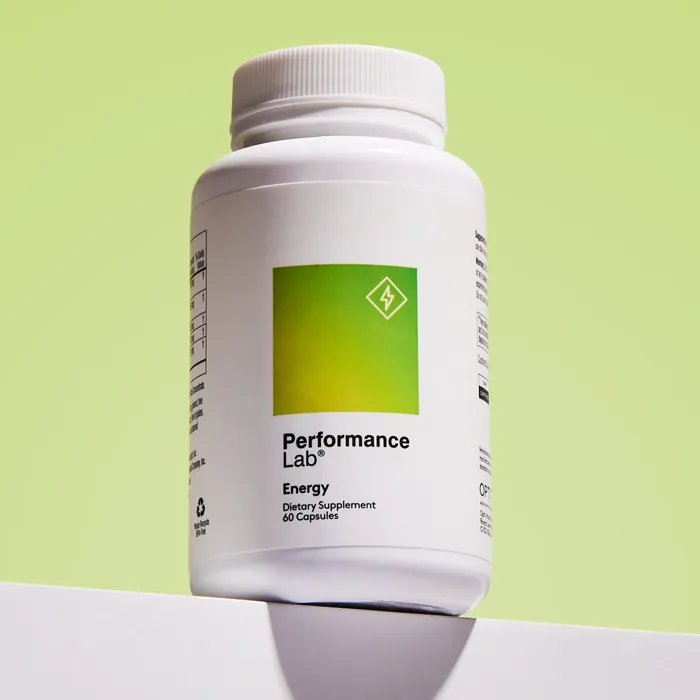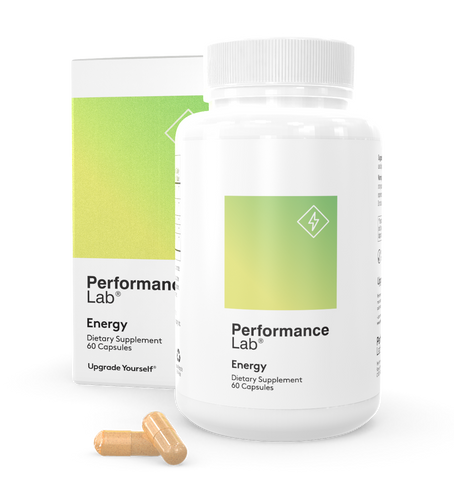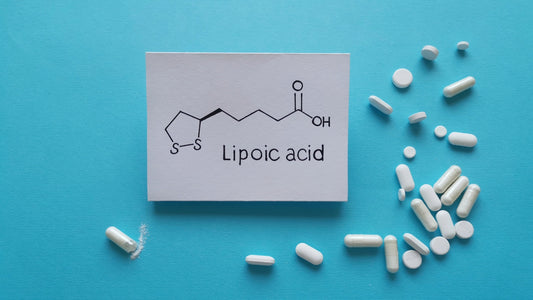If you’re looking for an energy boost, there’s no shortage of routes you can go. Coffee or caffeine is one of the most widely consumed stimulants worldwide, but we also have other natural things like tea, guarana, cacao, Yerba mate, and more. While these guys offer potent stimulatory effects, what if you want the same hit of energy without the actual “stimulant” part?
That’s where stim-free energy supplements come into the picture. Mega-dosing hardcore compounds effectively hype you up, but it comes with a cost—a nasty energy hangover later and long-term adrenal exhaustion. Instead, we’re talking about 100% natural energy produced by supporting the energy-makers of your body—your mitochondria.
Want in on the secret to stim-free long-lasting energy? We’re giving you two of our favorite energy boosters—PQQ and CoQ10. This article breaks down everything you need to know about PQQ and CoQ10 and why they need to be in your stack.
Let’s dive in.
Key Takeaways
- PQQ and CoQ10 both work at the mitochondrial level to support ATP production, which is the fundamental source of energy for every cell in the body.
- CoQ10 helps existing mitochondria work more efficiently while acting as a powerful antioxidant, especially in high-energy tissues like the heart and brain.
- PQQ appears to promote the creation of new mitochondria and offers strong antioxidant and neuroprotective activity, which can support metabolism, cognition, and resilience to stress.
- Stacking PQQ with CoQ10 creates a stim-free “power combo” that can boost daily vitality without relying on high doses of caffeine or other harsh stimulants.

What is PQQ?
Pyrroloquinoline quinone, more commonly known as PQQ, is a dietary antioxidant naturally found in several foods such as leafy vegetables, fruits, and legumes but is also concentrated in human breast milk 1. Because humans don’t have the ability to synthesize PQQ, it must be obtained through diet.
Research is still investigating the biological roles of PQQ in humans, but studies have shown that it’s involved in numerous essential physiological functions, including neonatal growth, reproductive performance, hepatic and muscular functions, and mitochondrial biogenesis, but it also possesses neuroprotective and antioxidant properties that support cognitive health and immune function 1.
What Does It Do?
The mechanisms behind how PQQ works still aren’t completely clear, but we do know that it plays a major role in supporting the health and function of mitochondria, the powerhouses of all cells in the body. The mitochondria produce the bulk of energy needed for performance, so any sort of dysfunction means a major hit.
However, research shows that PQQ may enhance mitochondrial function and biogenesis and improve metabolic homeostasis 2. It does this through activation of cAMP response element-binding protein (CREB) and peroxisome proliferator-activated receptor-γ coactivator-1α (PGC-1α), a major pathway involved in regulating mitochondrial biogenesis 3.
Aside from its role in supporting mitochondrial function, it may also have some other important functions:
- Protects cells from oxidative damage (antioxidant)
- Neuroprotection
- Enhances cognitive function
- Regulates blood glucose
What is CoQ10?
Coenzyme Q10, generally referred to simply as CoQ10, is a vitamin-like fat-soluble quinone naturally present in the body. It is found in considerably high concentrations in the most active tissues with the highest energy turnover rate, such as the heart, brain, liver, and kidneys 4. Because CoQ10 is concentrated in highly metabolically active tissues, deficiency has been linked to several cardiometabolic disorders 5.
CoQ10 is vital for the proper transfer of electrons within the mitochondrial oxidative respiratory chain, which is responsible for producing ATP, but it also appears to boost levels of ATP by preventing the loss of the adenine nucleotide pool from cardiac cells 6.
What’s more, it has also even been shown to prevent lipid peroxidation by acting as an antioxidant scavenger and an indirect stabilizer of calcium channels to decrease calcium overload.
What Does It Do?
It’s well established that CoQ10 is heavily involved in the oxidative phosphorylation process in cell’s mitochondria, which means that it’s a key component of energy (ATP) production that fuels all processes in the body.
Virtually all ATP is produced in mitochondria through oxidative phosphorylation, and because virtually all cellular functions depend on sufficient ATP, CoQ10 is essential for maintaining the health of all human tissues and organs 7.
As we said, in tissues with the highest metabolic activity like the heart and brain, CoQ10 possesses powerful antioxidant, bioenergetic, anti-inflammatory, membrane stabilizer, and antiatherogenic functions. Because of these properties, it’s been shown as a useful supplement in the treatment of several chronic and acute diseases, including 5:
- Hypertension
- Ischemic heart disease
- Myocardial infarction
- Heart failure
- Viral myocarditis
- Cardiomyopathies
- Dyslipidemia
- Obesity
- Type 2 diabetes
- Metabolic syndrome
PQQ + CoQ10: Better Together
If you want to maximize your energy without having to rely on heavy stimulants, we have the stack for you—PQQ + CoQ10.
Like PQQ, CoQ10 supports and enhances energy production at the cellular level, so when you combine these supplements, they elicit a synergistic effect on modulating cellular signaling pathways, preventing damage from free radicals, and supporting mitochondrial function.
PQQ and CoQ10 deliver a power-packed punch. CoQ10 helps to improve the speed and efficiency of mitochondria, while PQQ assists by promoting mitochondrial biogenesis. Together they work to produce more energy faster.
Here’s what we mean.
We love CoQ10 for boundless energy because:
- Sparks cell energy: CoQ10 shuttles electrons and protons across mitochondrial membranes, helping convert energy in foods into ATP cell energy.
- Mitochondrial protection: CoQ10 converts into ubiquinol, an antioxidant that protects mitochondria from free radicals’ cell-damaging, age-accelerating effects.
- Mitochondrial biogenesis: CoQ10 has been shown to stimulate the formation of new mitochondria in response to oxidative stress to boost energy production and efficiency.
While PQQ is strongly associated with healthy mitochondrial function on its own, it complements CoQ10’s mitochondrial support by:
- Stimulating mitochondrial biogenesis: PQQ works in concert with CoQ10 but via unique bioactivity—influencing genetic pathways involved in regulating mitochondria.
- Fighting mitochondrial oxidative stress: It’s suggested that PQQ possesses 5,000x the antioxidant power of vitamin C, providing stronger mitochondrial protection against damaging free radicals.
Simply put, PQQ is a nootropic that supports sharper memory, more energy, protects the brain, and enhances mitochondrial function by increasing their numbers. On the other hand, CoQ10 ensures that the mitochondria you do have are functioning optimally and at their highest capacity.
When all the mitochondria you do have are operating with more “spark,” it translates to more energy, healthier cells, and improved cognitive and full-body function.
They both offer great benefits for energy and health, but together they provide greater benefit than either on their own; there is a multiplier effect to combining PQQ and CoQ10.
Conclusion
If you’re looking for this dynamic duo, Performance Lab Energy supplies both of them and more. It’s an ultramodern supplement designed to supercharge daily performance with stim-free vitality. It works without caffeine for a smarter, cleaner, and healthier energy boost.

Featuring MicroActive® Q10, BioPerine®, BioPQQ®, and Bio-Enhanced® nutrition technology, Energy optimizes cells’ mitochondria for a surge of natural energy and vitality in both body and mind.
And unlike energy pills loaded with synthetic additives, Energy is clean.
No caffeine, no crash, no extras. Just pure revitalizing energy in 100% plant-based NutriCaps®.
References
- KR Jonscher, RB Rucker. Chapter 13- Pyrroloquinoline Quinone: Its Profile, Effects on the Liver and Implications for Health and Disease Prevention. Dietary Interventions in Liver Disease. 2019:157-173.
- M Akagawa, M Nakano, K Ikemoto. Recent progress in studies on the health benefits of pyrroloquinoline quinone. Biosci Biotechnol Biochem. 2016;80(1):13-22.
- W Chowanadisai, KA Bauerly, E Tchaparian, A Wong, GA Cortopassi, RB Rucker. Pyrroloquinoline quinone stimulates mitochondrial biogenesis through cAMP response element-binding protein phosphorylation and increased PGC-1alpha expression.J Biol Chem. 2010;285(1):142-152.
- MT Tran, TM Mitchell, DT Kennedy, JT Role of coenzyme Q10 in chronic heart failure, angina, and hypertension. Pharmacotherapy. 2001;21:797–806.
- VI Zozina, S Covantev, OA Goroshko, LM Krasnykh, VG Kukes. Coenzyme Q10 in Cardiovascular and Metabolic Diseases: Current State of the Problem. Curr Cardiol Rev. 2018;14(3):164-174.
- RA Bonakdar, E Guarneri. Coenzyme Q10. American Family Physician. 2005; 72(6):1065-1070
- R Coenzyme Q10: The essential nutrient. J Pharm Bioallied Sci. 2011;3(3):466-467.
















